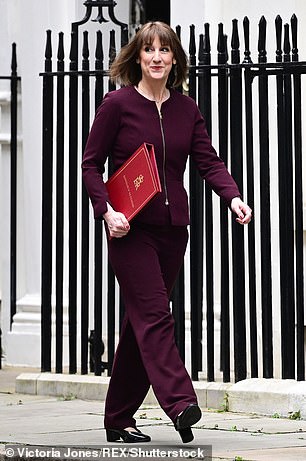Rachel Reeves has been given a fresh growth headache as the OECD downgraded its UK outlook and warned the Chancellor to act with ‘prudence’ on the public finances.
The OECD called for the Chancellor to target tax loopholes and even highlighted council tax rises as a potential way to raise revenue.
It said Britain should re-evaluate council tax bands, which could see households hit with bigger bills, particularly those living in larger homes, or expensive parts of the country, such as the South East.
Britain’s economy is expected to grow by just 1.3 per cent this year, down from a previous forecast of 1.4 per cent, according to the Paris-based Organisation for Economic Cooperation and Development.
And growth for next year is pencilled in at 1 per cent, down from 1.2 per cent.

Homeowners and renters in larger properties could be hit with bigger council tax bills, if Rachel Reeves follows the OECD’s advice

The OECD’s gloomy outlook painted a picture of UK growth continuing to be below par
‘Momentum is weakening, with business sentiment rapidly deteriorating,’ the OECD said, adding that the state of the public finances posed a ‘significant downside risk’.
It urged Reeves not to loosen the purse strings, cautioning that she only had a ‘very thin’ amount of wiggle room left to balance the books.
Economists have warned that Reeves may have to raise taxes in her next Budget if the UK’s finances do not improve.
But after promising not to raise income tax, national insurance, or VAT, the Chancellor is in a tricky position.

Budget bad news: Rachel Reeves may have to raise taxes again in autumn
The OECD said: ‘A balanced approach should combine targeted spending cuts, including closing tax loopholes; revenue-raising measures such as re‑evaluating council tax bands based on updated property values; and the removal of distortions in the tax system.’
The darkening outlook will add to speculation that Ms Reeves will stage another big tax raid.
Yesterday, analysts at Deutsche Bank said they expected ‘upwards of £10billion in tax rises to be announced in the autumn Budget’
The OECD also warned that stubborn inflation – fuelled by Labour’s national insurance and minimum wage hikes – could force the Bank of England to leave interest rates higher for longer.
It forecasts that rates will fall by a further 0.75 percentage points in this cycle but not reach that level for a year.
The report said: ‘Bank Rate is projected to be lowered gradually from its current value of 4.25 per cent and reach a terminal value of 3.5 per cent in the second quarter of 2026, as inflation continues to converge towards target and growth slows below potential.’
It came as Bank governor Andrew Bailey cast doubt on official figures showing that Britain enjoyed the strongest start to the year of any member of the G7 group of advanced economies.
Mr Bailey told MPs that evidence from businesses painted a much weaker picture Office for National Statistics data pointing to growth of 0.7 per cent in the first quarter of 2025.
‘The surveys are nothing like as strong as that,’ he told the Treasury select committee.
‘My own visits around the country are somewhat supporting the survey evidence.
The Chancellor is under intense pressure from Cabinet colleagues and Labour’s Left ahead of the government’s spending review this month.
The government is being urged to reverse winter fuel payment and child benefit cuts and dole out big spending rises, notably for defence.
But Ms Reeves was urged by the OECD to stand firm. It pointed to the ‘substantial’ interest payments on Britain’s debt pile that are weighing further on the public finances.
In its latest global economic outlook, the OECD said: ‘Fiscal prudence is required… strengthening the public finances remains a priority.’
The report said that Britain’s ‘currently very thin fiscal buffers’ could prove ‘insufficient’ if the Chancellor wanted to stimulate the economy in the event of fresh shocks. It called for ‘targeted spending cuts’ as well as tax reforms.
The report comes just a week after a similar call from the International Monetary Fund (IMF) to ‘stay the course’ in bringing the public finances under control.
Responding to the OECD, Ms Reeves said: ‘Delivering economic growth and improving living standards is my number one mission.’
SAVE MONEY, MAKE MONEY

Isa offer

Isa offer
40% off account fees for six months

Fix energy bills

Fix energy bills
Check price cap beating deals with uSwitch

Fee-free Isa investing

Fee-free Isa investing
Free share and ETF dealing, no account fee
5.70% cash Isa
5.70% cash Isa
Rate boosted for three months, then 4.85%

Get £20 off an MOT

Get £20 off an MOT
£20 This is Money Motoring Club voucher
Affiliate links: If you take out a product This is Money may earn a commission. These deals are chosen by our editorial team, as we think they are worth highlighting. This does not affect our editorial independence. Terms and conditions apply on all offers.
